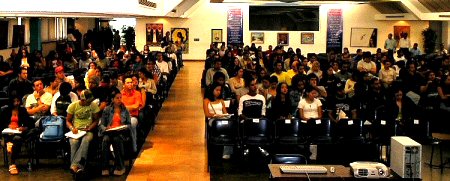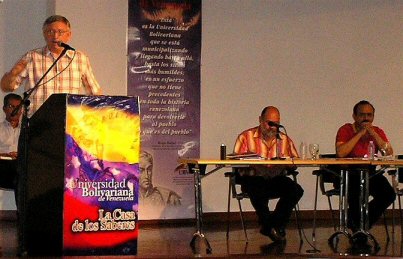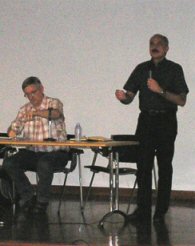Enthusiastic response for Marxist ideas: Successful public meetings in Caracas
- 13 April 2005
 |
On Monday April 11 and Tuesday April 12, the Revolutionary Marxist Current (CMR) organized two very successful public meetings at the Bolivarian University. In the first meeting there were five hundred people and in the second over four hundred. The audience consisted mainly of young people, students and Bolivarian activists, but in both meetings there was a fair number of workers and trade unionists.
The subject of the first meeting was “Workers’ Control, Venepal Shows the Way”. The subject of the second meting was “Socialism in the 21st Century”. The speakers on Monday were Jorge Paredes, one of the leaders of the occupied factory Costructor Nacional de Valvulas, Luis Primo, of the regional executive of the UNT in Caracas and Miranda, Ricardo Galindez, a leader of the oil workers’ union in Lara and editor of the Marxist paper, Topo Obrero. The last speaker was Alan Woods, editor of Marxist.com.
 |
CNV workers with Alan Woods and Pablo Cormenzana (CMR) |
The response of the audience was enthusiastic, in both meetings. The speakers emphasised the need for the Bolivarian Revolution to go beyond the limits of capitalism, for the workers to follow the example of Venepal and introduce workers’ control as a step towards nationalisation and a socialist planned economy. This position was warmly applauded by those present, many of whom feel that the revolution has not gone far enough. The argument that it is necessary to combat bureaucracy and introduce control from below got a particularly keen applause.
On Tuesday there were just two speakers. The first was Comandante William Izarra, the Vice Minister of Foreign Affairs. Comrade Izarra has been identified with the left wing of the Bolivarian Movement. In his speech he emphasised that so far the Revolution had carried out reforms but had not brought about a fundamental change. He likened this to pruning a tree and picking the flowers, whereas what was needed was to attack the roots. Socialism, he said, must mean that power must pass to the people.
William Izarra stressed that it was impossible to carry out a revolution while the old state apparatus remained intact, all the old judges, bureaucrats and governors were an obstacle in the road of advance that must be removed. These points were greeted with wild applause and cries of “Power to the People” and “Power to the Workers”. Comrade Izarra expressed his thanks to the Revolutionary Marxist Current for inviting him and expressed the wish for the collaboration of all genuinely revolutionary forces.
 |
Alan Woods speaking, Luis Primo (UNT Caracas) and Ricardo Galindez (CMR) on platform |
The second speaker, Alan Woods, was greeted with warm applause. He is already widely known for his consistent defence of the Revolution and also for his continued advocacy of socialism. Alan welcomed the declarations of Hugo Chavez that capitalism is slavery and that the Bolivarian Revolution must advance to socialism. Alan warned that the counter-revolution was not yet defeated and that it was dangerous to spread illusions.
He pointed out that the motor force of the Revolution was the masses and above all the working class. He stressed that there was no way forward unless the Revolution expropriated the oligarchy and nationalised the land, the banks and the big companies under workers’ control. Those who opposed this on the grounds of so-called realism were really the worst utopians. Unless this step was taken, the correlation of class forces, which was very favourable, would inevitably change. Workers would become disappointed and fall into apathy. At that point the counter-revolution would strike. Either we smash the counter-revolutionaries, or they will smash us, he said.
 |
William Izarra speaking |
Alan emphasised that although the Bolivarian Revolution had its own unique personality and specific identity, it had to learn from other revolutions of the past, especially the Russian Revolution. Alan quoted Lenin’s programme of four points and showed that these were absolutely relevant to Venezuela today. The audience was particularly enthusiastic about the demand for the recall of bureaucrats and a limitation on the salaries of all functionaries. When Alan cited Lenin’s demand to arm the people, there were loud chants in favour of a people’s militia. The workers of Venezuela are ready to fight.
After a lively debate in which different views were freely
expressed, analysed and criticised, the meeting ended in a mood of
euphoria. At the end, comrade Woods appealed to all present to help in
the building of a genuine Marxist revolutionary tendency in the
Bolivarian Movement, a tendency represented by the Revolutionary
Marxist Current. The Current has grown rapidly in size and influence,
as the success of these meetings clearly showed. The reason for this
success is quite clear. The Marxists are expressing consciously the
real aspirations of the workers and the revolutionary people.
 |
On Monday April 11 and Tuesday April 12, the Revolutionary Marxist Current (CMR) organized two very successful public meetings at the Bolivarian University. In the first meeting there were five hundred people and in the second over four hundred. The audience consisted mainly of young people, students and Bolivarian activists, but in both meetings there was a fair number of workers and trade unionists.
The subject of the first meeting was “Workers’ Control, Venepal Shows the Way”. The subject of the second meting was “Socialism in the 21st Century”. The speakers on Monday were Jorge Paredes, one of the leaders of the occupied factory Costructor Nacional de Valvulas, Luis Primo, of the regional executive of the UNT in Caracas and Miranda, Ricardo Galindez, a leader of the oil workers’ union in Lara and editor of the Marxist paper, Topo Obrero. The last speaker was Alan Woods, editor of Marxist.com.
 |
CNV workers with Alan Woods and Pablo Cormenzana (CMR) |
The response of the audience was enthusiastic, in both meetings. The speakers emphasised the need for the Bolivarian Revolution to go beyond the limits of capitalism, for the workers to follow the example of Venepal and introduce workers’ control as a step towards nationalisation and a socialist planned economy. This position was warmly applauded by those present, many of whom feel that the revolution has not gone far enough. The argument that it is necessary to combat bureaucracy and introduce control from below got a particularly keen applause.
On Tuesday there were just two speakers. The first was Comandante William Izarra, the Vice Minister of Foreign Affairs. Comrade Izarra has been identified with the left wing of the Bolivarian Movement. In his speech he emphasised that so far the Revolution had carried out reforms but had not brought about a fundamental change. He likened this to pruning a tree and picking the flowers, whereas what was needed was to attack the roots. Socialism, he said, must mean that power must pass to the people.
William Izarra stressed that it was impossible to carry out a revolution while the old state apparatus remained intact, all the old judges, bureaucrats and governors were an obstacle in the road of advance that must be removed. These points were greeted with wild applause and cries of “Power to the People” and “Power to the Workers”. Comrade Izarra expressed his thanks to the Revolutionary Marxist Current for inviting him and expressed the wish for the collaboration of all genuinely revolutionary forces.
 |
Alan Woods speaking, Luis Primo (UNT Caracas) and Ricardo Galindez (CMR) on platform |
The second speaker, Alan Woods, was greeted with warm applause. He is already widely known for his consistent defence of the Revolution and also for his continued advocacy of socialism. Alan welcomed the declarations of Hugo Chavez that capitalism is slavery and that the Bolivarian Revolution must advance to socialism. Alan warned that the counter-revolution was not yet defeated and that it was dangerous to spread illusions.
He pointed out that the motor force of the Revolution was the masses and above all the working class. He stressed that there was no way forward unless the Revolution expropriated the oligarchy and nationalised the land, the banks and the big companies under workers’ control. Those who opposed this on the grounds of so-called realism were really the worst utopians. Unless this step was taken, the correlation of class forces, which was very favourable, would inevitably change. Workers would become disappointed and fall into apathy. At that point the counter-revolution would strike. Either we smash the counter-revolutionaries, or they will smash us, he said.
 |
William Izarra speaking |
Alan emphasised that although the Bolivarian Revolution had its own unique personality and specific identity, it had to learn from other revolutions of the past, especially the Russian Revolution. Alan quoted Lenin’s programme of four points and showed that these were absolutely relevant to Venezuela today. The audience was particularly enthusiastic about the demand for the recall of bureaucrats and a limitation on the salaries of all functionaries. When Alan cited Lenin’s demand to arm the people, there were loud chants in favour of a people’s militia. The workers of Venezuela are ready to fight.
After a lively debate in which different views were freely
expressed, analysed and criticised, the meeting ended in a mood of
euphoria. At the end, comrade Woods appealed to all present to help in
the building of a genuine Marxist revolutionary tendency in the
Bolivarian Movement, a tendency represented by the Revolutionary
Marxist Current. The Current has grown rapidly in size and influence,
as the success of these meetings clearly showed. The reason for this
success is quite clear. The Marxists are expressing consciously the
real aspirations of the workers and the revolutionary people.

 Please help build the campaign by
Please help build the campaign by